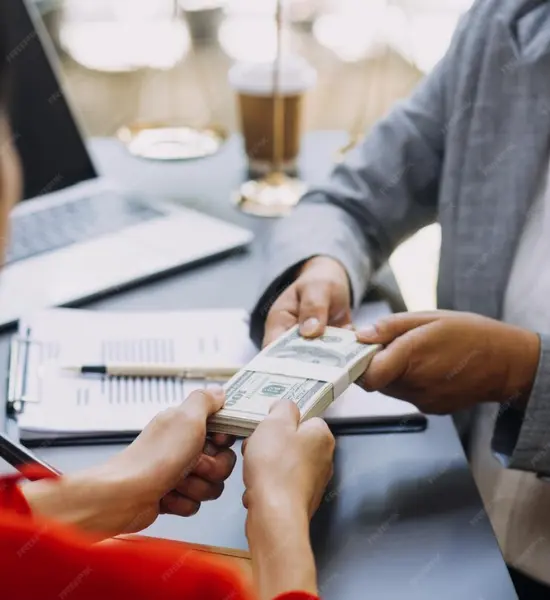Buy Foreign Currency
Unimoni, an RBI-authorized and AD II license holder, is your reliable source for buying any foreign currency at the best exchange rate. Whether you're traveling abroad for personal, business, education, work, or emigration purposes, you can trust us to provide the currency you need. With our exceptional customer service, simplified paperwork, and minimal wait times, you can rest assured that your currency will be in your hands promptly.
Documents Required To Buy Foreign Currency
The following documents must be produced while buying foreign currencies:
- Passport
- PAN card
- Ticket & Visa

Process of Buying Foreign Currency
You can purchase foreign currency from Unimoni through these simple steps:
- Go to your nearest Unimoni branch
- Bring your Passport or other valid identification documents.
- Tell the cashier the amount of currency you want to buy and the currency you want to buy it in.
- Pay for the currency.
- Receive the currency.
Only resident Indians can purchase foreign currencies, while NRIs and foreigners can reconvert their unspent currencies. The reconversion can be done up to the unspent balance or up to ₹50,000, whichever is lower, by providing a valid encashment certificate in the customer's name. You can reconvert up to ₹10,000 without an encashment certificate. With ATM receipts and other relevant documents, you can reconvert up to ₹50,000.
It is often advisable to carry some foreign money as currency notes for immediate needs, such as paying for food, drink, or a cab while traveling abroad. The maximum amount one can carry in the form of currency notes is USD 3,000. The excess amount can be carried in your Prepaid Forex Travel Cards. Unimoni offers 3 unique Forex cards for your needs: Multi-Currency Forex Travel Card, One Currency Forex Travel Card and Study Abroad Forex Travel Card. Know more at https://www.unimoni.in/travel-card.php.
Why Unimoni ?
When it comes to buying foreign currencies and fulfilling your currency exchange requirements, Unimoni is the best choice. With over 25 years of service in the financial industry, we have a nationwide network of 300+ branches, 15,000+ agent locations, and 4.6 million+ customers. We ensure you get the most value for your money, minimising the cost of currency conversion. We offer a wide range of currencies, competitive rates, convenient access, tight security measures, and exceptional customer service.

Global Support in a Range of Languages
Unimoni Customer Helpline and Call Service
Call 1800 102 0555, Toll Free number to access free detailed yet simply explained information about our products and services.
We have a presence throughout India and are always available to assist you.
Currency Conversions to INR
FAQ's
You can buy foreign currency from Unimoni at their branches or online. Here are the steps on how to buy foreign currency from Unimoni online:
- Go to the Unimoni website and click the "Foreign Exchange" tab.
- Select the currency you want to buy.
- Enter the amount of currency you want to buy.
- Choose a delivery method. You can pick up the currency at a Unimoni branch or deliver it to your home or office.
- Pay for the currency.
Here are the steps on how to buy foreign currency from Unimoni at a branch:
- Go to a Unimoni branch.
- Bring your passport or other valid identification.
- Tell the cashier the amount of currency you want to buy and the currency you want to buy it in.
- Pay for the currency.
- Receive the currency.
The exchange rate for the currency you want to buy will vary depending on many factors, including the currency you are buying, the currency you are selling, the current market conditions, and the fees charged by the money transfer service you use.
You can check the exchange rate for the currency you want to buy on the remitforex website. To do this, follow these steps:
- Go to the remitforex website.
- Click on the "Exchange Rates" tab.
- Select the currency you want to buy from the "Buy Currency" dropdown menu.
- Select "Sell Currency" dropdown menu.
- Click on the "Get Quote" button.
The remitforex website will show you the current exchange rate for the currency you want to buy. The exchange rate is the number of units of the foreign currency you will receive for one unit of your home currency.
Yes, there are often fees or commissions associated with buying foreign currency. These fees can vary depending on the money transfer service you use, the money you buy, and the currency you buy.
Here are some of the most common fees associated with buying foreign currency:
- Foreign transaction fee: The card issuer will charge you a fee for using your card to purchase a foreign currency. Usually, the fee charged is calculated based on a percentage of the total transaction amount.
- Markup: This is the difference between the exchange rate you see and the exchange rate the money transfer service uses to buy or sell currency. The markup is how the money transfer service makes money.
- Commission: This is a flat fee the money transfer service charges for buying or selling currency.
- Delivery fee: This is a fee the money transfer service charges for delivering the foreign currency to you.
Before making a purchase, it is advisable to compare the fees charged by various money transfer services. You can also negotiate the fees with the money transfer service.
Remitforex is an online Forex platform powered by Unimoni India, an Authorized Dealer II, and is a leader for Send Money Abroad in India with 300 plus branch networks. Unimoni India is the first Company in India to get an Authorized Dealer II license and specializes in Sending Money Abroad for most Indians online.
Whether it is better to buy currency in advance or wait until you arrive in the destination country depends on many factors, including:
- The currency you are buying.
- The exchange rate.
- The money transfer service charges the fees.
- Your personal preferences.
Here is a general overview of the pros and cons of each option:
Buying currency in advance
- Pros: You can lock in the exchange rate, which can be helpful if the currency is expected to appreciate.
- Cons: You may have to pay higher fees than if you wait until you arrive in the destination country.
- You may not be able to get the best exchange rate, as the rate may fluctuate before you travel.
Waiting until you arrive in the destination country
- Pros: You can get a better exchange rate than buying currency in advance.
- Cons: The exchange rate may depreciate before you arrive, so that you could get less for your money.
- You may have to pay high fees for using a credit card or ATM in a foreign country.
Ultimately, the best way to buy currency is from your homeland in advance.
The forms of payment accepted when buying a foreign currency vary depending on the money transfer service you use. However, some of the most common forms of payment accepted include:
- Cash: This is the most common form of payment for buying foreign currency.
- Credit card: Many money transfer services accept credit cards, but you may have to pay a foreign transaction fee.
- Debit card: Debit cards are also a common form of payment for buying foreign currency. You may not have to pay a foreign transaction fee using your debit card.
- Bank transfer: This is a less common form of payment for buying foreign currency, but it may offer lower fees.
- Traveler's check: Traveler's checks are becoming less common, but some money transfer services may still accept them.
It is essential to check with your money transfer service to see what payment forms they accept.
Yes, there are limits on the foreign currency you can buy in India. The limits vary depending on the purchase's purpose and the currency type.
You can buy up to USD 250,000 per financial year (April-March) for personal travel. This limit applies to all foreign currencies combined.
The limit is higher if you buy foreign currency for business purposes. You can buy up to USD 1 million per financial year.
There are also limits on the amount of foreign currency you can carry when you travel to or from India. You can carry up to USD 5,000 in Cash without declaring it to customs. You must declare it to customs if you carry more than USD 5,000.
It is important to note that these are just the general limits. Other limits may apply to you, depending on your specific circumstances. You should always check with the Reserve Bank of India (RBI) for the latest limits.
Yes, you can return or exchange unused foreign currency in India. However, the process may vary depending on the bank or money exchange dealer you are dealing with.
Here are some of the things you can do to return or exchange unused foreign currency in India:
- Check with the bank or money exchange dealer: The first step is to check with the bank or money exchange dealer where you bought the foreign currency. They may have a policy in place for returning or exchanging unused currency.
- Provide proof of purchase: Provide proof of purchase, such as a receipt or exchange slip. It will help the bank or money exchange dealer identify the currency and exchange rate applied.
- Be prepared to pay a fee: Some banks and money exchange dealers may charge a fee for returning or exchanging unused foreign currency. The amount of the fee may vary depending on the institution.
Whether or not it is possible to buy currency for a country with currency restrictions depends on the country and the severity of the limits.
Some countries have stringent currency restrictions, making buying currency from outside the country difficult or impossible. For example, North Korea and Cuba have strict currency controls, and purchasing currency from outside countries is almost impossible.
Other countries have less strict currency restrictions, but buying currency from outside the country may still be tricky. For example, India has some currency restrictions, and obtaining a permit from the Reserve Bank of India may be necessary to buy foreign currency.
If you are trying to buy currency for a country with currency restrictions, it is essential to research and understand the regulations in place.
Some risks involve buying foreign currency, such as counterfeit notes or scams.
- Counterfeit notes: Counterfeit notes are fake currency made to look like the real thing. They can be challenging to spot, even for experienced dealers. If you receive counterfeit notes, you may be unable to exchange them for real currency.
- Scams: Many scams target people who are buying foreign currency. For example, you may be asked to pay a deposit for currency that you never receive. Or, you may be told that you can get a better exchange rate if you buy currency from a particular dealer.
To avoid these risks, it is essential to be aware of them and to take steps to protect yourself. Here are some tips:
- Buy currency from a reputable dealer: Choose a dealer with a good reputation and license to sell foreign currency.
- Scrutinize the currency: Carefully inspect the currency to ensure it is genuine before purchasing. Look for signs of counterfeiting, such as poor printing or missing security features.
- Ask for a receipt: Always ask for a receipt when you buy foreign currency. It will help you to prove that you have purchased the currency if there is a problem.
- Beware of high exchange rates: Be wary of dealers that offer very high exchange rates. These rates may be too reasonable to be accurate and could signify a scam.
Awareness of the risks of buying currency online is also essential. Many reputable online money transfer services allow you to purchase foreign currency. However, many scams target people who are buying currency online. Please conduct thorough research before selecting an online money transfer service to mitigate potential risks.
Yes, you can buy foreign exchange at the airport. However, it is not always the best option.
Here are some of the pros and cons of buying foreign exchange at the airport:
Pros:
- Convenience: Airport currency exchange bureaus are typically open 24 hours a day, 7 days a week, so you can get the currency you need when needed.
- Availability: Airport currency exchange bureaus are typically located in the arrivals area, so you can get the currency you need as soon as you arrive.
- Flexibility: Airport currency exchange bureaus typically offer a variety of currencies so you can get the currency you need for your destination.
- Exchange rates: The exchange rates offered by airport currency exchange bureaus are typically not as good as those provided by other providers, such as banks or online money transfer services.
- Fees: Airport currency exchange bureaus typically charge high fees, which can affect your budget.
- Time constraints: If you are short on time, you may not have the time to compare exchange rates and find the best deal..
Cons:
If you want the best possible exchange rate, it is best to avoid buying foreign exchange at the airport. Instead, you can compare exchange rates online or at a bank before you travel. You can also use an online money transfer service to buy foreign exchange.
Yes, you can buy foreign exchange for multiple countries at once. However, the specific options available to you will vary depending on the money transfer service you use.
Here are some of the things to keep in mind when buying foreign exchange for multiple countries:
- The money transfer service: Some money transfer services only allow you to buy currency for one country at a time. Others allow you to purchase currency for multiple countries, but they may charge a higher fee.
- The exchange rates: The exchange rates for different currencies can fluctuate, so comparing the rates before you make a purchase is essential.
- The fees: The fees charged by different money transfer services can vary, so it is essential to compare them before purchasing.
- The delivery method: The delivery method for foreign currency can also vary, so it is essential to choose a convenient way.
If you are looking to buy foreign exchange for multiple countries, it is best to compare the options available and then choose.
Reload it online:
You can refill your travel card if you run out of foreign currency during your trip. Most travel card providers allow you to reload your card online using a credit or debit card. It is the most convenient way to fill your card, but it may not be available in all countries.
Yes, there are several benefits to using prepaid travel cards or traveler's checks instead of Cash when travelling abroad:
- Security: Prepaid travel cards and traveler's checks are more secure than Cash because they are not linked to your bank account. If they are lost or stolen, anyone else cannot access the money.
- Convenience: Prepaid travel cards and traveler's checks can be used anywhere that accepts credit cards. Travelling to a country where Cash is not widely accepted can be helpful.
- Flexibility: You can load a prepaid travel card with the exact amount of money you need, so you don't have to worry about carrying large amounts of Cash. You can also reload the card as required.
- Exchange rates: You can lock in the best exchange rate when you purchase a prepaid travel card or traveler's checks, saving you money.
- Fraud protection: Most prepaid travel cards and traveler's checks offer fraud protection so that you will be reimbursed for any unauthorized charges.
Yes, you can negotiate the exchange rate when buying foreign exchange. However, it is essential to note that not all currency exchange bureaus are willing to negotiate. It is also necessary to know the prevailing exchange rate before negotiating. Here are the things to keep in mind when dealing with the exchange rate:
- The amount of money you are exchanging: If you are exchanging a large amount, you may be more likely to get a better rate.
- The time of day: The exchange rate can fluctuate throughout the day. You may get a better rate if you exchange money during off-peak hours.
- The currency exchange bureau: Some currency exchange bureaus are more willing to negotiate than others—research to find a bureau with a good reputation for negotiating.





























